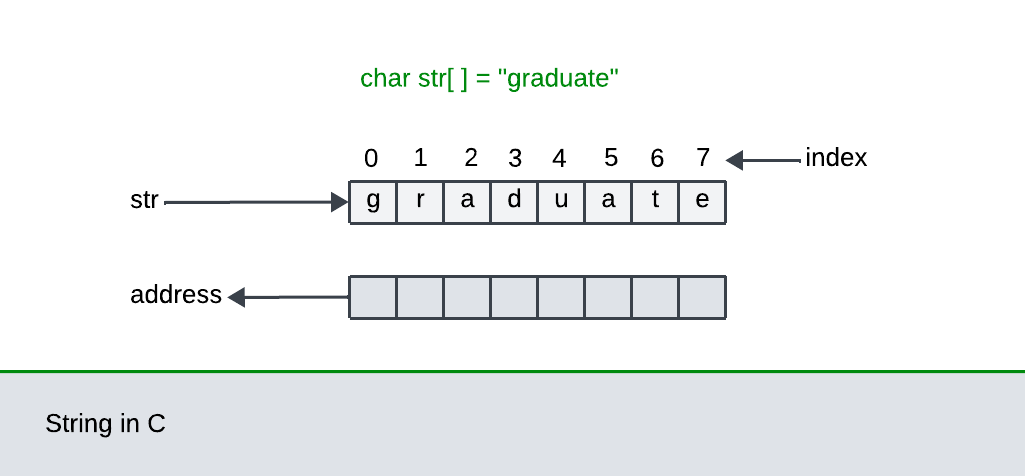- String programs in C are a group of characters, numbers, and symbols that are enclosed in double quotes called a string.
- Ex: “India”
- A string is also called an array of characters or character array.
- Every string is terminated with ‘\0’ or NULL characters.
- Each character of the string occupies 1 byte of memory.
- The last character of a string is \0. The compiler automatically puts \0 at the end of the string even though we have not specified it.

Table of Contents
String Syntax in C:
Data type array name [size];Ex: char str[10];
Initializing the string in C:
Ex: char str[] = { ‘r’,’a’,’m’,’a’,’\0’};
char str[5] = {‘r’,’a’,’m’,’a’};
char str[] = “rama”;
char str[5] = “rama”;
Reading the String programs in C:
- In order to read the string from the keyboard we can use a formatted or unformatted function.
- The formatted function is
scanf(“%s”, &str);
The unformatted function is
Gets(str);
Displaying the String programs in C:
- The string programs in C can be displayed on the screen either by using formatted functions or unformatted functions.
- The formatted function is
printf(“%s”, str);
The unformatted function is
Puts(str);
Displaying the string programs in C in different formats:
The string can be displayed in different formats by using only the formatted function.
Char str[15] = “prabhakar”
Printf(“%s”, str); prabhakar
Printf(“%4s”, str); prabhakar
Printf(“%10s”, str); prabhakar
Printf(“%.4s”, str); prab
Printf(“%.6s”, str); prabha
Printf(“%10.4s”, str); _ _ _ _ _ _ prab
Printf(“%-10.4s”, str); prab
palindrome string program in c
#include <stdio.h>
#include <string.h> // For strlen() function
int main() {
char str[100]; // Array to store the input string
int i, len, flag = 0; // Variables for indexing, length, and palindrome check
// Get input from the user
printf("Enter a string: ");
scanf("%s", str);
// Calculate the length of the string (excluding the null terminator)
len = strlen(str);
// Check if the string is a palindrome
for (i = 0; i < len / 2; i++) {
// Compare characters from the beginning and end, moving inwards
if (str[i] != str[len - i - 1]) {
// If any pair of characters doesn't match, it's not a palindrome
flag = 1; // Set the flag to indicate non-palindrome
break; // Exit the loop early
}
}
// Display the result based on the flag value
if (flag == 0) {
printf("%s is a palindrome.\n", str);
} else {
printf("%s is not a palindrome.\n", str);
}
return 0; // Indicate successful program execution
}
Output:
Enter a string: garduate
garduate is not a palindrome.
Example program to accept and display the string using formatted functions
#include <stdio.h>
#include <string.h>
int main() {
char name[50]; // Character array to store the string (max 49 characters)
// Input using fgets() to prevent buffer overflow
printf("Enter your name: ");
fgets(name, sizeof(name), stdin); // Read input string, including spaces
// Remove trailing newline character from fgets()
name[strcspn(name, "\n")] = 0;
// Display using printf()
printf("Hello, %s!\n", name);
// Display the length of the string using the strlen() function
printf("Your name has %zu characters.\n", strlen(name));
return 0;
}Output
Enter your name:Example program to accept and display the string using unformatted functions.
#include <stdio.h>
int main() {
char user_input[100]; // Assuming maximum input length is 100 characters
// Accepting input from the user
printf("Enter a string: ");
fgets(user_input, sizeof(user_input), stdin);
// Displaying the string without formatted functions
printf("You entered: ");
fputs(user_input, stdout); // Using fputs to print the string
return 0;
}Output
Enter a string: 